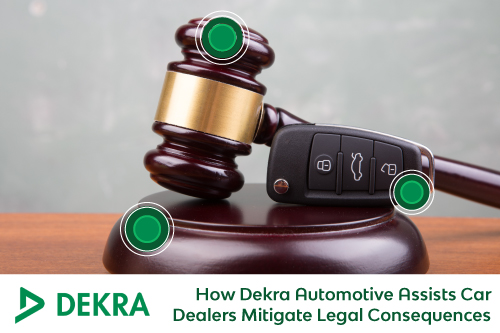
Car Dealerships and the Consumer Protection Act: Mitigating the legal liability and responsibility related to the CPA
The Consumer Protection Act was signed into power in 2009, tasking the car dealership industry with the onus of clear transparency as to the state of a vehicle at the time of a sale.
Mitigating the legal liability and responsibility related to the Consumer Protection Act is no small matter, considering the fact that a business could be fined R1 million for non-compliance or the Director of an organisation could be locked behind bars.
Signed on 24 April 2009, the Consumer Protection Act 68 of 2008 (CPA) enshrines the South African consumer with a host of rights. 'The car dealership industry is not exempt from its regulations. As a matter of fact, the consumer rights upheld in the CPA should epitomise the work ethic within every car dealership as it is based on the provision of personalised client service, playing open cards with a prospective client and earning their trust, which are all concepts that are underscored in the CPA,' says Garth Johnson, CEO DEKRA Automotive.
DEKRA Automotive offers a list of aspects contained within the Consumer Protection Act, that have a direct bearing on car dealerships:
- A consumer's right to choose or examine goods - If the consumer has agreed to purchase goods solely on the basis of a description or sample, or both, provided by the supplier, the goods delivered to the consumer must in all material respects and characteristics correspond to that which an ordinary alert consumer would have been entitled to expect based on the description or on a reasonable examination of the sample, as the case may be.
- Consumer's right to return goods - the consumer may return goods to the supplier and receive a full refund of any consideration paid for those goods, if the supplier has delivered goods that the consumer did not have an opportunity to examine before delivery, and the consumer has rejected delivery of those goods.
- Right to information in plain and understandable language - a notice, document or visual representation is in plain language if it is reasonable to conclude that an ordinary consumer of the class of persons for whom the notice, document or visual representation is intended, with average literacy skills and minimal experience as a consumer of the relevant goods or services, could be expected to understand the content, significance and import of the notice, document or visual representation without undue effort.
- General standards for marketing of goods or services - A producer, importer, distributor, retailer or service provider must not market any goods or services in a manner that is reasonably likely to imply a false or misleading representation concerning those goods or services.
- False, misleading or deceptive representation - it is a false, misleading or deceptive representation to falsely state or imply, or fail to correct an apparent misapprehension on the part of a consumer to the effect, that any service, part, replacement, maintenance or repair is needed or advisable.
- Consumer's rights to safe, good quality goods - every consumer has a right to receive goods that will be useable and durable for a reasonable period of time, having regard to the use to which they would normally be put and to all the surrounding circumstances of their supply.
'Providing a prospective client with a comprehensive, digitalised and image-rich condition report of a vehicle that was inspected by an independent team of experts in the field, is the perfect solution to addressing the legal liability and responsibilities set out by the Consumer Protection Act,' says Johnson.
Improving a customer's perception of quality is quintessential to growing the stature of the second-hand car market and reducing after-sales comebacks. 'If a client is one hundred percent informed on what they are buying, then there can be no misinterpretation or misrepresentation. An independent vehicle report will provide a prospective buyer with the basic information related to the car, such as mileage, make, model and service history, but will also illuminate the technical condition of what is under the hood, What you see is what you get, which means it is then up to the client to decide whether they are comfortable to take on the risk themselves, knowing exactly what the risks are,' explains Johnson.
How DEKRA assists dealerships to adhere to the CPA
DEKRA Automotive acts as an independent service provider free of any particular industry or stakeholder bias with services and products that extend across the entire value chain of a motor vehicle:
- Roadworthy certification and registration.
- Multi-point check reports.
- Technical inspections.
- The installation of SABS approved microdots.
- Used car management software.
'It all boils down to providing the client with the means to make an informed decision when purchasing a second-hand vehicle. Independent reporting allows the car dealership to be completely transparent with a prospective client as to the actual state of the vehicle while adhering to the provisions set out by the Consumer Protection Act,' concludes Johnson.
Visit www.dekraauto.co.za for more information.
More about DEKRA South Africa
DEKRA Automotive Pty Ltd commenced operations in South Africa on 1 October 2008 and is a joint venture partnership with DEKRA Germany, a market leader in the supply of roadworthy certificates and technical checks - the DEKRA seal - and is present in 19 countries worldwide.
DEKRA is known for its highest standards of quality, the level of expertise of its employees and the fact that once DEKRA places its name on a product; be it a roadworthy or safety certificate, the DEKRA name is completely trusted.
We believe this knowledge and awareness helps to build safety for motorists and the community, and above all, the preservation of human life through the delivery of quality products.
We have nationwide branches to assist you where it is most convenient.

